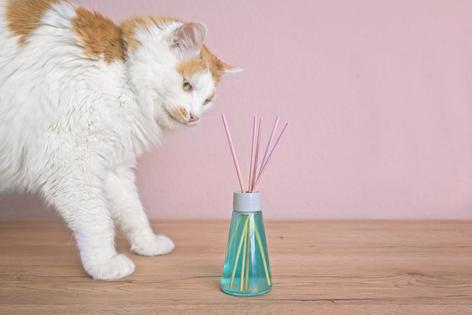My Pet World: Could air fresheners and other scented products be making our pets sick?
Dear Cathy,
We currently do not have pets, as we’ve been traveling, but many of our friends and neighbors do, especially small dogs. While walking, we often stop to pet them. Many smell strongly of air freshener, and the scent even rubs off on our hands.
We can’t imagine what it must be like for them, given their heightened sense of smell. And if it transfers that easily, we wonder what it must taste like – or how it affects them – when they groom themselves. One friend’s dog has terrible itching, and we can’t help but wonder if air fresheners might be a contributing factor.
We were wondering if you would consider writing an article on this issue that we can share with friends and neighbors. It might save some dogs from needless discomfort.
— Milton, Summers in Mainer, Winters in Florida
Dear Milton,
You are right to wonder about the impact air fresheners and strong artificial scents can have on our pets. Dogs and cats have a much more sensitive sense of smell than we do, so what seems pleasant to us can be overwhelming – or even harmful – to them.
Research shows that many air fresheners contain volatile organic compounds (VOCs), such as formaldehyde and phthalates, which can irritate the respiratory systems of both people and pets.
Some products also contain essential oils, which may be toxic when inhaled, ingested, or absorbed through the skin. Pets exposed to strong fragrances may experience symptoms like sneezing, coughing, wheezing, itching, or skin irritation, especially if those chemicals settle on their fur and are later ingested during grooming.
While allergies, parasites, or food sensitivities are common causes of skin issues, chemical exposure is an important factor that pet owners should consider. Although most evidence is still anecdotal, there is research highlighting the negative effects of VOCs on indoor air quality and respiratory health. The ASPCA and veterinary toxicologists frequently caution against using heavily scented products around animals.
To help protect pets' sensitive systems, I recommend reducing the use of scented products, choosing fragrance-free cleaners, and keeping a home well-ventilated. Even natural products should be used with care and only under veterinary guidance. For those who prefer more natural approaches, The Essential Oil Safety Guide for Pets by Dr. Melissa Shelton – a veterinarian specializing in essential oil use with animals – offers practical, science-based advice on what’s safe, how to use it properly, and what to avoid.
Thank you for bringing this important topic to light. Raising awareness can make a real difference in the health and comfort of our pets.
Dear Cathy,
Samantha of Pittsburgh wrote about a cat who was not using its litter box. I had a cat that started doing the same thing. He was using one room as his litter box. I discovered the problem.
When we built our home, I kept large pieces of leftover carpeting. One day I put one down under the boxes to reduce litter tracking. That's when the problem started. I finally realized the scrap carpeting was the same as in that room he was using. I took up the carpeting, cleaned the area, and shut the room door. Later, when I finally opened the door, there was no longer a problem.
— Linda, Lincoln, Nebraska
Dear Linda,
Cats are indeed very sensitive to textures and smells, and it's not uncommon for them to confuse soft carpeting with an appropriate place to eliminate, especially if that texture matches something associated with their litter box area. Even well-meaning changes, such as placing carpet under the litter boxes to control tracking, can sometimes lead to unexpected problems. I'm so glad you were able to figure it out, remove the trigger, and resolve the issue without further stress for you or your cat.
Dear Cathy,
You recently suggested using Bitter Apple spray as a deterrent for pup chewing. Some years back, we had a Collie pup that was primarily an outdoor “farm dog.” She chewed everything, from chainsaw carvings to electric outdoor Christmas decorations. I tried the bitter apple spray, but came back to an empty, chewed up bottle. If they gotta chew, they gotta chew!
— Jeri, Mineral Point, Wisconsin
Dear Jeri,
It’s true that some pups, especially energetic working breeds like Collies, have a stronger need to chew, and sometimes, no amount of Bitter Apple can stand in their way. While deterrents like bitter Apple can help some dogs, others need more durable solutions, like plenty of appropriate chew toys, supervision, and sometimes just a good sense of humor when they outsmart us.
_____
_____
========
(Cathy M. Rosenthal is a longtime animal advocate, author, columnist and pet expert who has more than 25 years in the animal welfare field. Send your pet questions, stories and tips to cathy@petpundit.com. Please include your name, city, and state. You can follow her @cathymrosenthal.)
©2025 Tribune Content Agency, LLC.
(c) 2025 DISTRIBUTED BY TRIBUNE MEDIA SERVICES, INC.












Comments